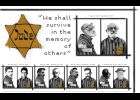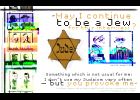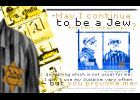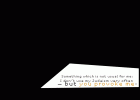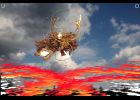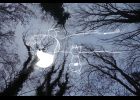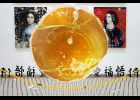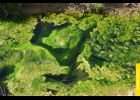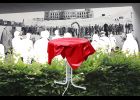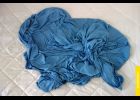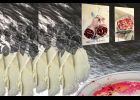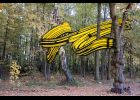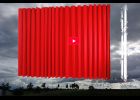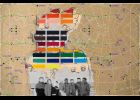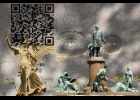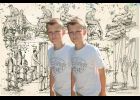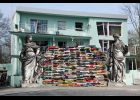Flusser Studies 26 - November 2018 / Special Issue: Flusser and Judaism
I. Vilém Flusser and Judaism
Crônica Israelita / Shalom
Let’s Besprechen: [On] Database Aesthetics Trial
The present remix-essay (database aesthetics from extermination formula to digital montage manifesto) is a collage-composition combining online-pictures of Flusser, Kafka, Warburg, Benjamin and Buber wearing the clothes of concentration-camp inmates. Flusser’s essay on the writer and Nobel Prize laureate Agnon calls attention to the fact that a Jew without his Jewish pride still remains “a Jew”. Judaism is an ideal model for those who do not blindly believe in models.
Jude Sein – Being Jewish – Ser Judeu / Spuren des Jüdischen in Vilém Flussers Denken
These two short essays try to retrace some of the main interrelated nodal points of the Jewish dimension in Vilém Fusser’s thinking and writing: Bodenlosigkeit, Heimatlosigkeit, nomadism, exodus, desert, sand, dune, tent, wind, bit, grain of sand, swarm, Sabbath, epoché, mysticism, nothingness, Pilpul, Talmud, polysemy, multilingualism, and translation.
Flusser e as ondas abissais
In Vilém Flusser’s books, Judaism is viewed not only as a religion, but also as a specific culture that allows the author to treat the issue of evil in universal terms from a perspective that reveals itself to be Jewish and Post-Shoah.
Construindo pontes: Ser judeu para os outros
This text examines Flusser’s conception of two kinds of Jews – one being a Jew to other Jews and the other a Jew to the world. Flusser opts for second possibility. For him, then, to be a Jew means to build bridges. Writing is a way of building bridges between one’s own Jewish experience and universal philosophical thought. The article focuses on Flusser’s correspondence with Milton Vargas and David Flusser in the two last years of his life, showing how his thoughts of impending death and the anguish of the Holocaust transformed his personal experience.
Désillusion: Vilém Flusser et le conflit israélo-palestinien / Disillusion: Vilém Flusser and the the Israeli-Palestinian conflict
This article presents ten essays written by Vilém Flusser between 1967 and 1991 on the conflict between Israel and the Palestinians. Some of these essays were not published. Although Flusser clearly asserts his Judaism and his pride in being a Jew, he is at the same time very critical of Zionism and the State of Israel. First, he thinks that the very existence of a Jewish national state is in contradiction with the ideal of Judaism―namely, to dedicate oneself to others―and he assumes therefore that Zionism, as a national state-building ideology and apparatus, can only fail. He also criticizes the relation between Israel and the Arab peoples, analyzing it as colonial domination and considering that Israel has failed to be the beacon of liberation and struggle against Western domination that it could and should have been. He hopes that Jews and Arabs (a formula he prefers to Israelis and Palestinians, as less grounded in territories) can overcome the conflict, draw closer and construct a new, non-Zionist model together, free of Western influences. Although this might sound utopian, Flusser trusts the Jews’ ability to contribute to such a model. These essays, especially the one entitled Disillusionment, written in Israel during his first trip in 1980, have a rather sad, bitter and disenchanted flavor. Flusser made his second and last trip to Israel in September 1991, two months before his death.
A crise israelense / Desilusão / Os Judeus em Israel / Os Judeus no Mundo / The Jewish War
Flusser Against Idolatry
The article, based on the author’s doctoral thesis “Vilém Flusser: a critic of idolatry in the age of new media”, analyses the concept of idolatry as a thread connecting Flusser’s early writings on religion with the later ones on communication. Studying his sources and the main occurrences of the term “idolatry” in his writings can help us understand Flusser’s original conception. The first uses of the concept (1963-1967) are clearly embedded in his Jewish education and appear mostly in the context of his essays on hierophany and secularization, especially the ones where Flusser posthumously argues with his mentor Vicente Ferreira da Silva. From 1978, “idolatry” appears in a new context, namely his essays on media theory and communication, in particular where image and text are confronted. By connecting these two phases we are able to read his communication theory in the light of his studies on religion, understanding the key role of the concepts of idolatry, magic and myth in his later texts.
The concept of idolatry allows Flusser to reflect on images beyond an aesthetic approach. Images are not only objects of contemplation: they act on us, modifying the way we look at the world and therefore our beliefs and our behavior. However, his theory is not apocalyptic: idolatry does not emerge automatically through contact with images, but it is caused by a reversal of imagination. Training our technical imagination will help us overcome the danger of a new idolatry.
Flusser’s Philosophy of Science
Many of Flusser’s books and essays refer to “science”, “epistemology”, and “knowledge”. His ways of conceptualizing these terms, however, remain to be explored in detail. To my knowledge, there is no secondary literature that analyzes “Flusser’s philosophy of science”. In this paper, I begin outlining such a project. I offer two translations of unpublished manuscripts, “La creation scientifique et artistique” (“Scientific and artistic creativity”) and “Wissenschaft, Weisheit (und Judentum)” (“Science, Wisdom (and Jewishness)). Based on an initial and very superficial analysis, I suggest locating Flusser’s concept of science at the center of a triangle of reciprocal relationships between philosophy, art, and religion.
La création scientifique et artistique / Wissenschaft, Weisheit (und Judentum
II. On Photography
Die Verbesserung von Beobachtung
An artistic theory is different from a scientific one. The artist theorizes by addressing the breaking point of modernity, which is characterized by a change from considering a work to be a conceptual, and considering it to be a physical object. The artist describes this as a part of his art. Vilém Flusser analyzes the camera (the black box) in relation to administrative, economic, political, social apparatuses. Roland Barthes considers pictures from the double perspective of studium (the scanning process) and punctum (the captivating moment). In the present case, the artist’s theory and the photo collages bearing the title Photo Shop Massacre are to be understood in their conceptual intention as an indication of the actual massacre that is taking place around us.
